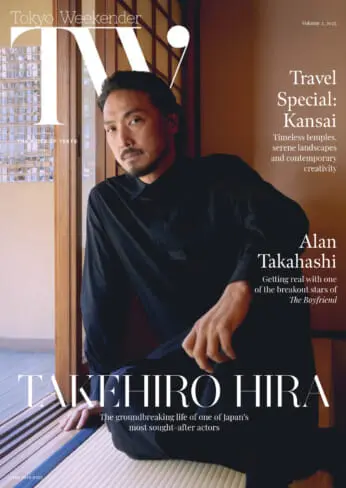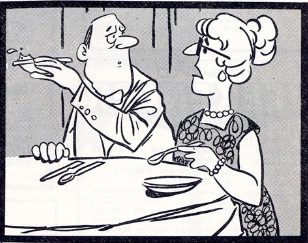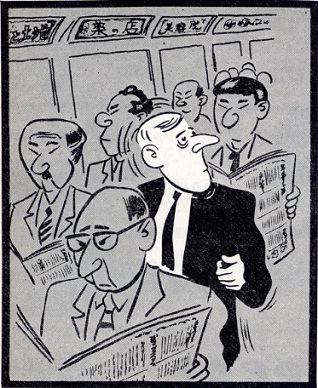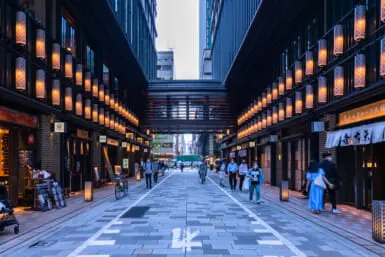by Jan Brown
In which a former Japan resident now removed to the doldrums of America’s Midwest—looks back with affection and sadness to a tour of duty here as the wife of a young U.S. Air Force officer . . .
“I’ve been in Japan too long,” resident gaijin frequently say to themselves, each other or any Japanese who happens to be irritating them at the moment—such as the lady with the pointy furoshiki and pointier elbows on the rush hour train.
But these often-heard words don’t always have the same meaning behind them. They can cover situations such as embarrassment (picking up a soup bowl at a formal dinner at the Hilton), pride (creating a lovely ikebana arrangement your instructor doesn’t have to redo), mock anger (admitting to yourself that you’d rather have yokisoba for lunch than a ‘burger), real anger (the meter reads ¥1,200 already and it’s the taxi’s third time in the same block looking for a typical Japanese address) and, when the time is ripe, in all sincerity— you are ready to go home.
How does one know for sure when he or she has reached the latter “I’ve been in Japan too long”? Possibly someone in this situation can benefit from the experiences of one former resident gaijin who is now pulling up crabgrass, listening to the TV speak English (but still not saying much of anything), zipping into roomy shopping center parking lots and other such suburban pastimes you may recall.
OK, then, you’ve been in Japan too long when:
♦ You’ve forgotten your instant price tag conversions at ¥300 to the dollar and don’t really care anymore.
♦ Department store clerks throw your purchases into brown paper bags instead of spending 10 minutes carefully wrapping each item in colorful paper and folding the paper over and over until it can be sealed with a single piece of tape—and then placing the tiny tea cups you bought into a big shopping bag.
♦ No one stares at you on the Yamanote Line anymore and you have to ride three hours into the country before they do.
♦ Futon departments display entire lines of Pierre Cardin futon and zabuton covers.
♦ Your favorite “typically Japanese” shopping area now includes a McDonalds, Dairy Queen, Shakey’s and Dunkin’ Donuts—and you wonder how Colonel Sanders could have missed it.
♦ A Big Mac is 280 yen.
♦ You admit a preference for Japanese-style public toilets because it seems more sanitary not to sit down.
♦ You’ve learned to substitute “toilet” for its euphemisms because you can get very uncomfortable while searching for a Japanese who knows where the “restroom” is.
♦ You catch yourself pushing through gaijin crowds on base like you were in Shinjuku Station.
♦ Your head automatically nods and bows a lot even when speaking English to Americans.
♦ You’ve heard the Chicken Man series three times and still can’t figure out if he’s Charley Tuna or Gary Owens.
♦ You’ve finally mastered the art of chewing and swallowing absolutely anything that is offered, smiling and mumbling “oishii, desu ne?” as it somehow goes down and stays there.
♦ All your friends who are not Japanese have gone to the U.S. and write advising you buy one of everything in Japan since stateside prices are out of sight—but you already have some of it all.
♦ Your weekly meal planning has gradually evolved to hamburgers on Sunday and curry rice, shumai, fried rice, gratin, tonkatsu and yakisoba for the remainder of the week.
♦ You’ve finally learned through bitter experience not to mix sake and beer no matter how strenuously the host insists and to say “mo kekko desu” and make it stick.
♦ You are asked to sing an American song at a Japanese party and find out you and your spouse know different sets of lyrics to Yankee Doodle.
♦ The Japanese feel obligated to sing Sukiyaki and Sakura at parties because they assume those are the only Japanese songs you’ll recognize—but Sado Okesa happens to be your favorite.
♦ You resent being put in awkward situations like having to explain phrases such as “up yours” to a Japanese high school English class reading the play version of Love Story.
♦ Still in the afterglow of nine lovely days exploring the island of Taiwan, your Japanese students ask what the people in Taiwan are like—and you realize haven’t met any off the tourist trail as you have the Japanese.
♦ Your high school students say you are the only American they know and you are suddenly hit with the awesome responsibility of it.
♦ The lady next door who used to feed your dogs fish and pickles by shoving them through the slats of your bamboo fence with chopsticks moves away—and you’ve found the source of your dogs’ chronic halitosis.
♦ The bamboo fence you paid ¥72,000 for can’t possibly last through another typhoon season.
♦ After years of taking for granted the safety of the Tokyo subways and streets, you must consider confining your solo stateside outings to daylight and well-lighted crowds.
♦ You spend lots of time contemplating ways to smuggle your two favorite bonsai into the states, but, in the end, decide to give them to your maid in gratitude for doing your housework while you explored her country.
♦ You shock customers and salesclerks in the department store basement by filling your little plastic grocery carrier with 20 boxes of instant tofu—to take to Omaha.
♦ Your closest Japanese friend promises to send more tofu when your supply runs out and keeps bringing over packages of dried squid, instant miso soup, dried shiitake and tonkatsu sauce so you won’t starve in Omaha.
♦ You begin worrying about where you’ll find gyoza wrappers and Sapporo Beer in the midwest.
♦ You can’t wait to be the only one on your suburban Omaha block with a Bizenyaki collection, a Kyoto-style hibachi (bought at greatly inflated prices because you didn’t know what you would ever do with one when they were still cheap) and a kokeshi doll from almost every prefecture in Japan.
♦ You just know you’re going to be extremely rude to the next person who good-naturedly says something cute like “Bet you can’t wait to get back to The World” or “How did you ever stand it over here for five years?” when you’re leaving Japan in a week and the undeserving so-and-so has three years left.
♦ You tearfully conclude that your “I’ve been in Japan too long” is just plain not true—that you don’t want to go “home” because you are home…but your household goods have already gone (including tofu, kokeshi et al), the people moving into your house have stopped by to look it over, your husband has orders and a port call and you are very sure the Air Force would not look kindly on an up and coming young officer and spouse refusing to leave an assignment just because their years in Japan have been the most exciting, rewarding and treasured learning experience they will ever have.










